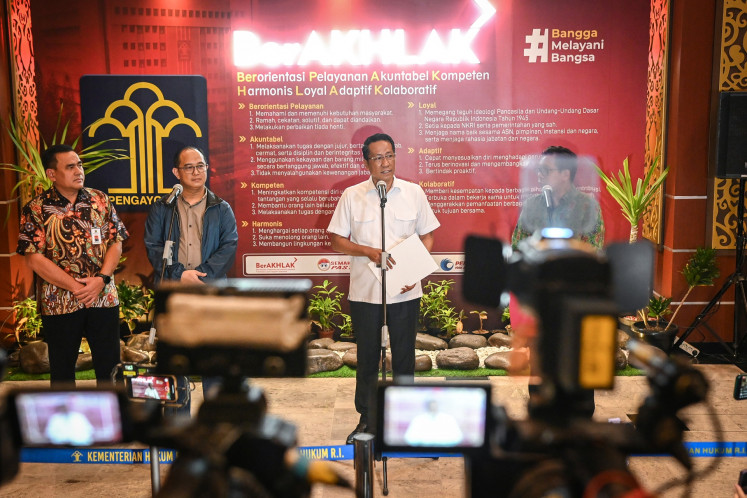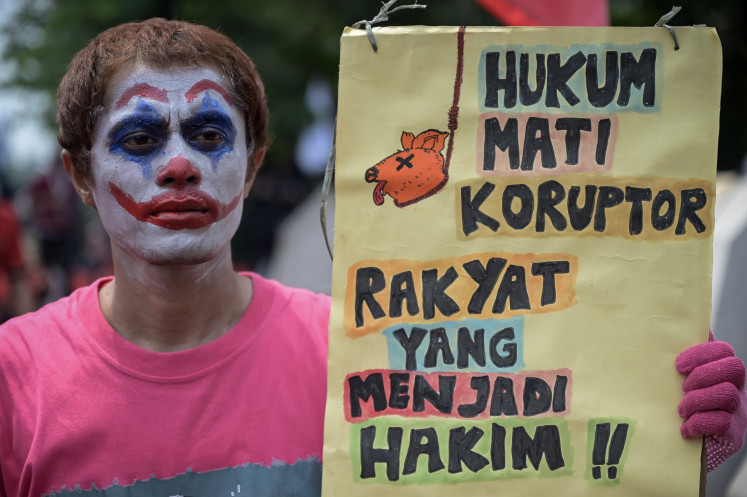Popular Reads
Top Results
Can't find what you're looking for?
View all search resultsPopular Reads
Top Results
Can't find what you're looking for?
View all search resultsMagazines survive by raising women's issues
By focusing on women's issues, several Indonesian magazines have survived tight competition with glossy local and international printed media
Change text size
Gift Premium Articles
to Anyone
By focusing on women's issues, several Indonesian magazines have survived tight competition with glossy local and international printed media.
Jurnal Perempuan (Women's Journal), which has discussed feminist issues since its establishment in 1995, is one of the few magazines that has survived and is making profits.
"We survived because we focused on issues like gender equality and we are probably now the only magazines that does," the journal's chief editor, Mariana Amiruddin, said.
She said other feminist magazines, set up by non-government women's organizations, were less successful because they used their publications as vehicles for their own agenda rather than for focusing on women's issues.
Jurnal Perempuan was founded by women activists, including Gadis Arivia, a lecturer at the University of Indonesia's School of Philosophy. It aimed to provide students with feminist readings.
In its earlier editions, the journal featured feminist philosophies and ran profiles on prominent feminists, such as Simon de Beauvoir, Betty Friedan and Julia Kristeva.
As its readership grew to include women activists and professionals, the journal discussed "real" women's problems, such as domestic violence, migrant workers, education and religion.
Many articles in the journal were academic, written by scholars and activists.
"In the beginning we found it hard to find writers, but now the number of writers has increased parallel to the rise in the number of women scientists and activists," Mariana said.
Some international organizations, such as the International Labor Organization and Ford Foundation, often sponsored the journal when it included subjects related to the organizations' concerns.
Currently, the Jurnal Perempuan Foundation, which publishes the journal, also produces radio programs, books and documentaries on women.
Besides Jurnal Perempuan, women activists here also read publications like Srinthil, published by the Desantara Foundation, or Rahima, published by the Rahima Foundation. Srinthil focuses on women and culture, while Rahima concentrates on women and Islam.
Among the "serious" journals, glossy women's magazines are now competing to grab women's attention.
Local magazines like Femina, Dewi and Gadis compete with Indonesia editions of Cosmopolitan, Harper's Bazaar and Cosmo Girl.
Alia, which was founded five years ago by senior journalists, is one of the magazines targeting Muslim working women.
Other than articles like "How to wear your Jilbab (Muslim headscarf)" in the office, Alia also discusses women's issues, such as domestic violence and polygamy.
"We give explanations and interpretations of parts of the Koran and Hadist (the deeds of Prophet Muhammad) related to women," the magazine's editorial secretary and journalist, Lina Marlena, said.
She said the magazine covered a broad range of issues not only related to work, but also domestic life since many housewives also read the monthly magazine.










